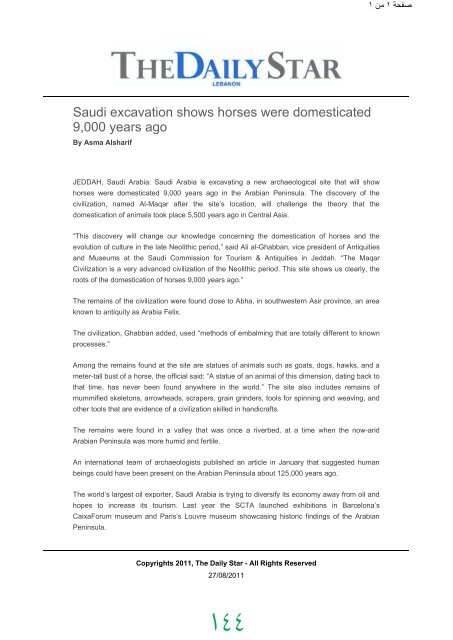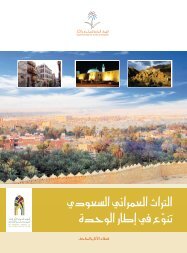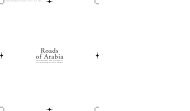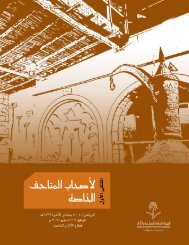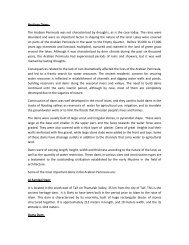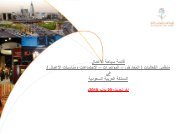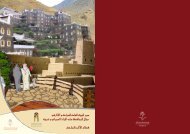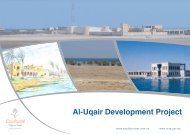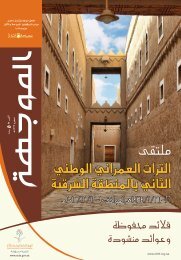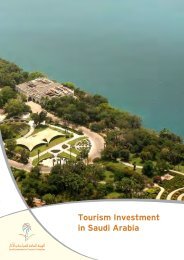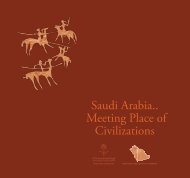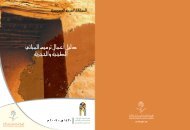ﺧïºØ¯Ù اï»ïº¤ïº®ï»£ï¯¿ï»¦
ﺧïºØ¯Ù اï»ïº¤ïº®ï»£ï¯¿ï»¦
ﺧïºØ¯Ù اï»ïº¤ïº®ï»£ï¯¿ï»¦
Create successful ePaper yourself
Turn your PDF publications into a flip-book with our unique Google optimized e-Paper software.
144<br />
http://www.dailystar.com.lb/ArticlePrint.aspx?id=147299&mode=print<br />
صفحة ١ من ١<br />
٣٢/١٠/١١<br />
Saudi excavation shows horses were domesticated<br />
9,000 years ago<br />
By Asma Alsharif<br />
JEDDAH, Saudi Arabia: Saudi Arabia is excavating a new archaeological site that will show<br />
horses were domesticated 9,000 years ago in the Arabian Peninsula. The discovery of the<br />
civilization, named Al-Maqar after the site’s location, will challenge the theory that the<br />
domestication of animals took place 5,500 years ago in Central Asia.<br />
“This discovery will change our knowledge concerning the domestication of horses and the<br />
evolution of culture in the late Neolithic period,” said Ali al-Ghabban, vice president of Antiquities<br />
and Museums at the Saudi Commission for Tourism & Antiquities in Jeddah. “The Maqar<br />
Civilization is a very advanced civilization of the Neolithic period. This site shows us clearly, the<br />
roots of the domestication of horses 9,000 years ago.”<br />
The remains of the civilization were found close to Abha, in southwestern Asir province, an area<br />
known to antiquity as Arabia Felix.<br />
The civilization, Ghabban added, used “methods of embalming that are totally different to known<br />
processes.”<br />
Among the remains found at the site are statues of animals such as goats, dogs, hawks, and a<br />
meter-tall bust of a horse, the official said: “A statue of an animal of this dimension, dating back to<br />
that time, has never been found anywhere in the world.” The site also includes remains of<br />
mummified skeletons, arrowheads, scrapers, grain grinders, tools for spinning and weaving, and<br />
other tools that are evidence of a civilization skilled in handicrafts.<br />
The remains were found in a valley that was once a riverbed, at a time when the now-arid<br />
Arabian Peninsula was more humid and fertile.<br />
An international team of archaeologists published an article in January that suggested human<br />
beings could have been present on the Arabian Peninsula about 125,000 years ago.<br />
The world’s largest oil exporter, Saudi Arabia is trying to diversify its economy away from oil and<br />
hopes to increase its tourism. Last year the SCTA launched exhibitions in Barcelona’s<br />
CaixaForum museum and Paris’s Louvre museum showcasing historic findings of the Arabian<br />
Peninsula.<br />
Copyrights 2011, The Daily Star - All Rights Reserved<br />
27/08/2011


